中国正在消亡的传统职业 英文作文
- 格式:doc
- 大小:28.50 KB
- 文档页数:3
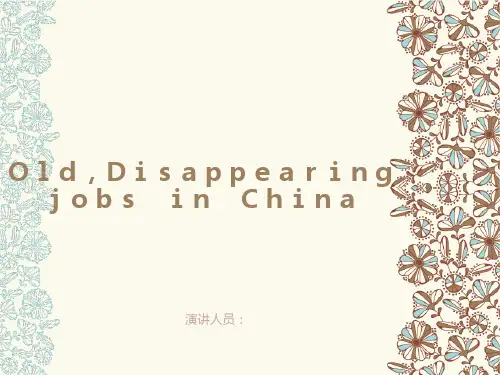
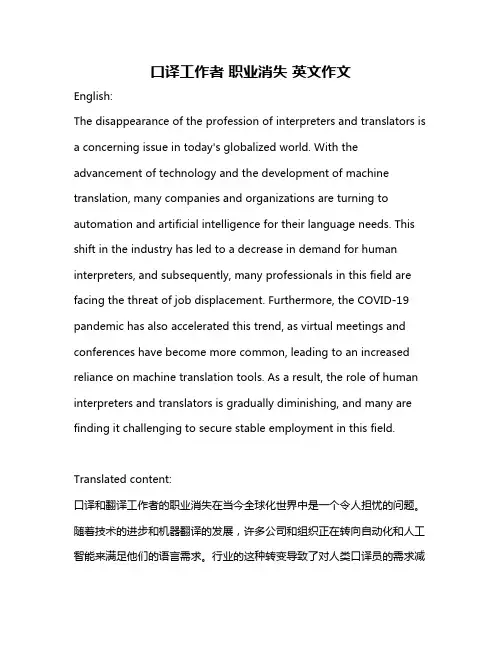
口译工作者职业消失英文作文English:The disappearance of the profession of interpreters and translators is a concerning issue in today's globalized world. With the advancement of technology and the development of machine translation, many companies and organizations are turning to automation and artificial intelligence for their language needs. This shift in the industry has led to a decrease in demand for human interpreters, and subsequently, many professionals in this field are facing the threat of job displacement. Furthermore, the COVID-19 pandemic has also accelerated this trend, as virtual meetings and conferences have become more common, leading to an increased reliance on machine translation tools. As a result, the role of human interpreters and translators is gradually diminishing, and many are finding it challenging to secure stable employment in this field.Translated content:口译和翻译工作者的职业消失在当今全球化世界中是一个令人担忧的问题。
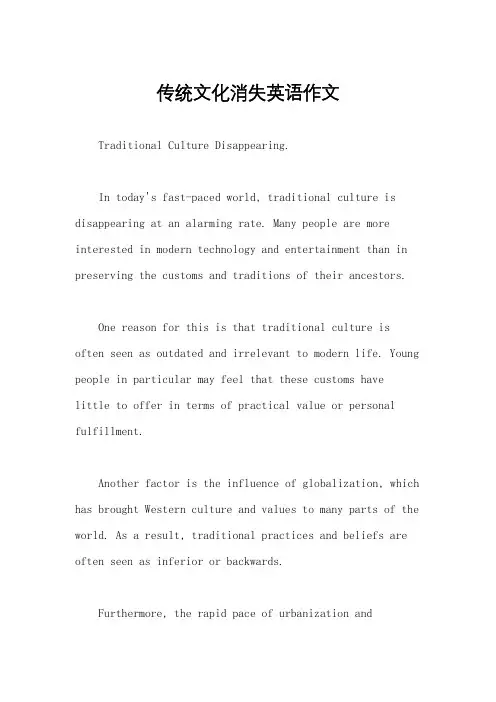
传统文化消失英语作文Traditional Culture Disappearing.In today's fast-paced world, traditional culture is disappearing at an alarming rate. Many people are more interested in modern technology and entertainment than in preserving the customs and traditions of their ancestors.One reason for this is that traditional culture is often seen as outdated and irrelevant to modern life. Young people in particular may feel that these customs havelittle to offer in terms of practical value or personal fulfillment.Another factor is the influence of globalization, which has brought Western culture and values to many parts of the world. As a result, traditional practices and beliefs are often seen as inferior or backwards.Furthermore, the rapid pace of urbanization andindustrialization has led to the destruction of many traditional communities and ways of life. As people move to cities and adopt new lifestyles, they may lose touch with their cultural heritage and forget the customs and traditions that once defined their identity.In conclusion, the disappearance of traditional culture is a complex and multifaceted issue. While there are many factors contributing to this trend, it is important that we recognize the value of our cultural heritage and take steps to preserve it for future generations. Only by doing so can we ensure that our rich and diverse traditions continue to enrich our lives and inspire us to create a better world.。
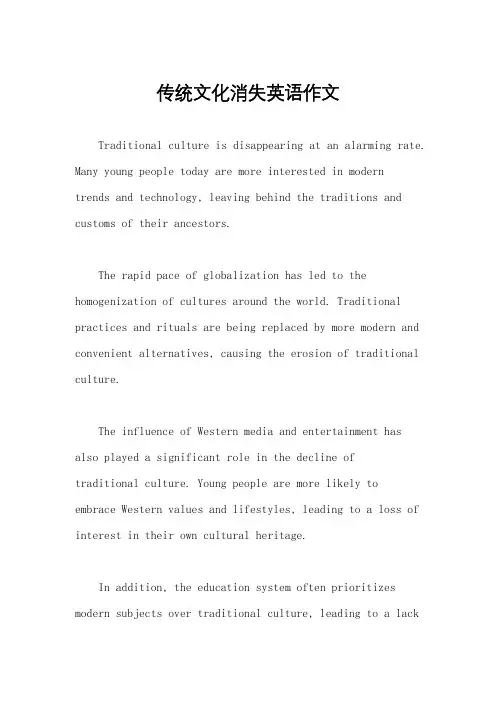
传统文化消失英语作文Traditional culture is disappearing at an alarming rate. Many young people today are more interested in moderntrends and technology, leaving behind the traditions and customs of their ancestors.The rapid pace of globalization has led to the homogenization of cultures around the world. Traditional practices and rituals are being replaced by more modern and convenient alternatives, causing the erosion of traditional culture.The influence of Western media and entertainment has also played a significant role in the decline oftraditional culture. Young people are more likely to embrace Western values and lifestyles, leading to a loss of interest in their own cultural heritage.In addition, the education system often prioritizes modern subjects over traditional culture, leading to a lackof understanding and appreciation for the customs andbeliefs of the past.As a result, traditional crafts and skills are being forgotten, traditional festivals are being celebrated with less enthusiasm, and traditional clothing and cuisine are being replaced by more modern alternatives.It is crucial for society to recognize the value of traditional culture and take steps to preserve and promote it. Efforts should be made to educate the youngergeneration about their cultural heritage and instill inthem a sense of pride and appreciation for their traditions.In conclusion, the disappearance of traditional culture is a concerning issue that requires immediate attention. It is important for individuals and communities to take proactive measures to preserve and promote theirtraditional customs and beliefs. Only by doing so can we ensure that the rich tapestry of our cultural heritage isnot lost to future generations.。
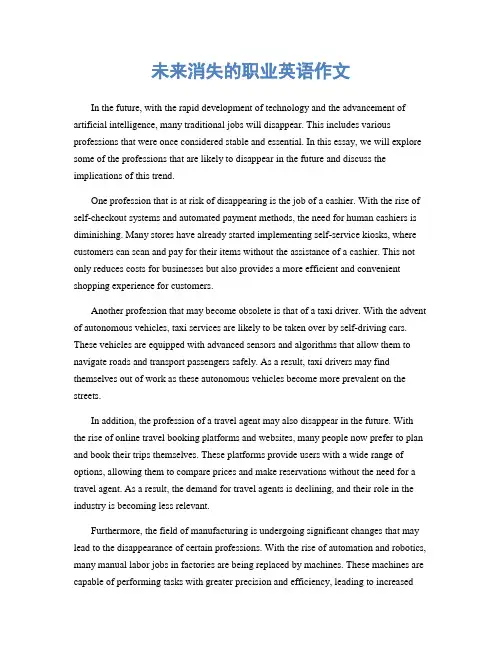
未来消失的职业英语作文In the future, with the rapid development of technology and the advancement of artificial intelligence, many traditional jobs will disappear. This includes various professions that were once considered stable and essential. In this essay, we will explore some of the professions that are likely to disappear in the future and discuss the implications of this trend.One profession that is at risk of disappearing is the job of a cashier. With the rise of self-checkout systems and automated payment methods, the need for human cashiers is diminishing. Many stores have already started implementing self-service kiosks, where customers can scan and pay for their items without the assistance of a cashier. This not only reduces costs for businesses but also provides a more efficient and convenient shopping experience for customers.Another profession that may become obsolete is that of a taxi driver. With the advent of autonomous vehicles, taxi services are likely to be taken over by self-driving cars. These vehicles are equipped with advanced sensors and algorithms that allow them to navigate roads and transport passengers safely. As a result, taxi drivers may find themselves out of work as these autonomous vehicles become more prevalent on the streets.In addition, the profession of a travel agent may also disappear in the future. With the rise of online travel booking platforms and websites, many people now prefer to plan and book their trips themselves. These platforms provide users with a wide range of options, allowing them to compare prices and make reservations without the need for a travel agent. As a result, the demand for travel agents is declining, and their role in the industry is becoming less relevant.Furthermore, the field of manufacturing is undergoing significant changes that may lead to the disappearance of certain professions. With the rise of automation and robotics, many manual labor jobs in factories are being replaced by machines. These machines are capable of performing tasks with greater precision and efficiency, leading to increasedproductivity and reduced labor costs. As a result, professions such as assembly line workers and machine operators may become obsolete in the future.Moreover, the profession of a cashier. With the rise of self-checkout systems and automated payment methods, the need for human cashiers is diminishing. Many stores have already started implementing self-service kiosks, where customers can scan and pay for their items without the assistance of a cashier. This not only reduces costs for businesses but also provides a more efficient and convenient shopping experience for customers.In conclusion, the rapid advancement of technology and artificial intelligence is expected to lead to the disappearance of various professions in the future. Jobs such as cashiers, taxi drivers, travel agents, and certain manufacturing roles are at risk of becoming obsolete. While this trend may bring about increased efficiency and convenience, it also raises concerns about unemployment and the need for retraining and reskilling. As we move towards a more automated future, it is important to adapt and embrace new opportunities that arise, while also ensuring that the workforce is adequately prepared for the changing job market.。
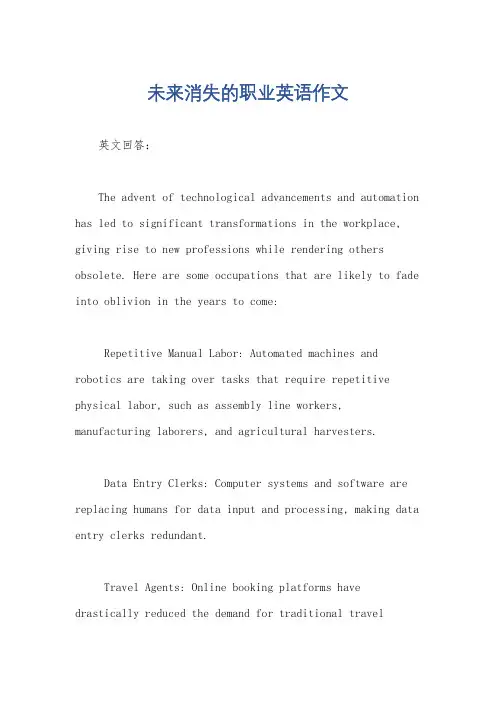
未来消失的职业英语作文英文回答:The advent of technological advancements and automation has led to significant transformations in the workplace, giving rise to new professions while rendering others obsolete. Here are some occupations that are likely to fade into oblivion in the years to come:Repetitive Manual Labor: Automated machines and robotics are taking over tasks that require repetitive physical labor, such as assembly line workers, manufacturing laborers, and agricultural harvesters.Data Entry Clerks: Computer systems and software are replacing humans for data input and processing, making data entry clerks redundant.Travel Agents: Online booking platforms have drastically reduced the demand for traditional travelagents, who assist clients with arranging travel plans.Bank Tellers: Automated teller machines (ATMs), mobile banking, and online financial services have made bank tellers less essential for routine transactions.Telemarketers: Automated call systems and email marketing have taken the place of telemarketers who solicit sales inquiries over the phone.Cashiers: Self-checkout kiosks and mobile payment systems are eliminating the need for cashiers in retail stores and restaurants.Factory Workers: Advanced manufacturing techniques, such as 3D printing and automated production lines, are replacing human labor in factory settings.Phone Operators: Voice over IP (VoIP) technology and interactive voice response (IVR) systems have replaced human phone operators who direct calls.Taxi Drivers: Ride-hailing services like Uber and Lyft are displacing traditional taxi drivers.Proofreaders: Automated grammar and plagiarismcheckers are replacing the need for human proofreaders to scrutinize written materials.中文回答:未来消失的职业。
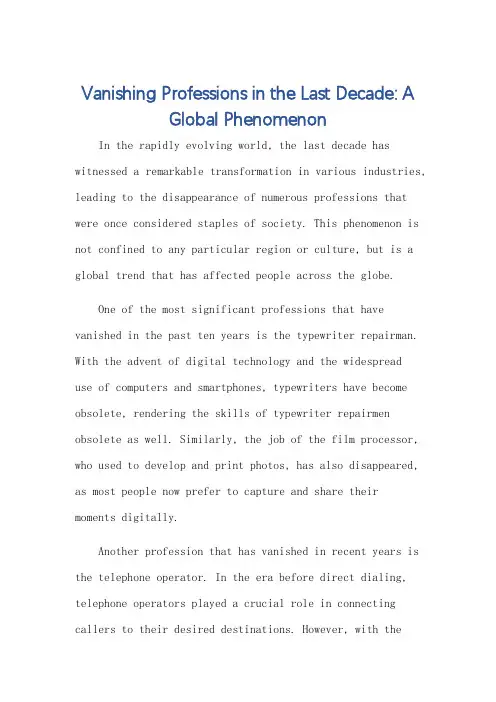
Vanishing Professions in the Last Decade: AGlobal PhenomenonIn the rapidly evolving world, the last decade has witnessed a remarkable transformation in various industries, leading to the disappearance of numerous professions that were once considered staples of society. This phenomenon is not confined to any particular region or culture, but is a global trend that has affected people across the globe.One of the most significant professions that have vanished in the past ten years is the typewriter repairman. With the advent of digital technology and the widespreaduse of computers and smartphones, typewriters have become obsolete, rendering the skills of typewriter repairmen obsolete as well. Similarly, the job of the film processor, who used to develop and print photos, has also disappeared, as most people now prefer to capture and share their moments digitally.Another profession that has vanished in recent years is the telephone operator. In the era before direct dialing, telephone operators played a crucial role in connecting callers to their desired destinations. However, with theadvent of automated dialing systems and the widespread use of mobile phones, the need for human operators has diminished significantly.The rise of online retail has also led to the disappearance of many traditional retail jobs. Brick-and-mortar stores are closing down, and even those that remain are often staffed by fewer employees due to automation and self-checkout systems. This trend has been particularly hard on cashiers, sales clerks, and other retail workers who have lost their jobs due to automation and online competition.The decline of the manufacturing industry has also contributed to the disappearance of numerous professions. Factory workers, machinists, and other manufacturing roles have become less common as companies automate their production processes and outsource manufacturing to cheaper labor markets.Moreover, the rise of artificial intelligence (AI) and machine learning has led to the automation of many white-collar jobs. Data entry clerks, accountants, and even someprogramming roles are now being performed by machines, reducing the need for human employees.The disappearance of these professions has had profound impacts on society. It has led to job losses and economic instability for many individuals and families. However, it has also created new opportunities and careers in emerging industries such as technology, healthcare, and green energy. In conclusion, the last decade has seen the disappearance of many professions due to technological advancements and changing industry landscapes. While this has brought about significant challenges, it has also presented new opportunities for growth and innovation. Aswe move forward, it is important to adapt to these changes and prepare for the future of work.**过去十年消失的职业:全球现象**在快速发展的世界中,过去十年见证了各行业的显著变革,导致许多一度被认为是社会支柱的职业逐渐消失。
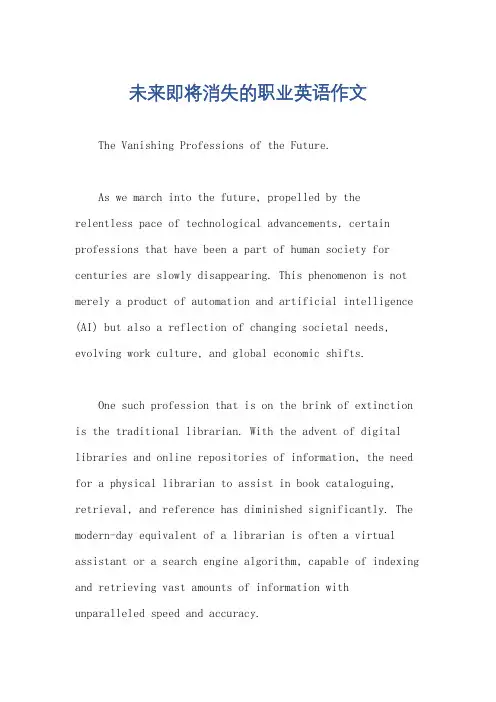
未来即将消失的职业英语作文The Vanishing Professions of the Future.As we march into the future, propelled by therelentless pace of technological advancements, certain professions that have been a part of human society for centuries are slowly disappearing. This phenomenon is not merely a product of automation and artificial intelligence (AI) but also a reflection of changing societal needs, evolving work culture, and global economic shifts.One such profession that is on the brink of extinction is the traditional librarian. With the advent of digital libraries and online repositories of information, the need for a physical librarian to assist in book cataloguing, retrieval, and reference has diminished significantly. The modern-day equivalent of a librarian is often a virtual assistant or a search engine algorithm, capable of indexing and retrieving vast amounts of information with unparalleled speed and accuracy.Another profession that is slowly fading away is the typist. In the pre-digital era, typists were essential for transcribing handwritten documents into typed form. However, with the widespread use of computers and smartphones,typing has become a基本技能 that most individuals possess. The advent of voice recognition software has further diminished the need for typists, as it can convert spoken words into text with remarkable accuracy.The rise of automation and robotics has also led to the decline of many manufacturing-related professions. Factory workers, who once toiled tirelessly on the assembly lines, are now being replaced by machines that can perform the same tasks with greater efficiency and precision. Whilethis shift has led to increased productivity and cost savings for manufacturers, it has also resulted insignificant job losses for those who depended on manuallabor for their livelihoods.The travel agent, a once-revered figure in the tourism industry, is also facing extinction. With the proliferationof online travel booking platforms and apps, individuals can now plan and book their own vacations with ease, eliminating the need for a middleman. These platforms provide real-time updates on flights, hotels, and attractions, allowing travelers to make informed decisions without having to rely on a travel agent's expertise.The banking sector has also seen a significant reduction in the number of physical bank tellers. As more and more people adopt digital banking and mobile payment solutions, the need for physical tellers to process transactions and provide customer service has decreased. Automated teller machines (ATMs) and virtual assistants handle most of the transactional work, while customers can access their accounts and perform transactions remotely using smartphones or computers.The disappearance of these professions does not necessarily signify a negative outcome. In fact, it often leads to the emergence of new, more fulfilling career opportunities. For instance, while the traditional librarian may be disappearing, the demand for informationscientists and data analysts is on the rise. Similarly, while factory workers may be losing their jobs to automation, there is a growing demand for skilled workers in fields like robotics, AI, and data analytics.Moreover, the decline of certain professions also forces individuals to reevaluate their skill sets and pursue further education or training to adapt to the changing job market. This, in turn, leads to a more skilled and diverse workforce that is better equipped to handle the challenges of the future.In conclusion, while the disappearance of certain professions may seem like a cause for concern, it is actually a natural evolution of the job market. As technology continues to advance and societal needs change, new professions will emerge to replace those that have become obsolete. It is important for us to embrace this change, adapt to new trends, and prepare ourselves for the opportunities and challenges that lie ahead.。
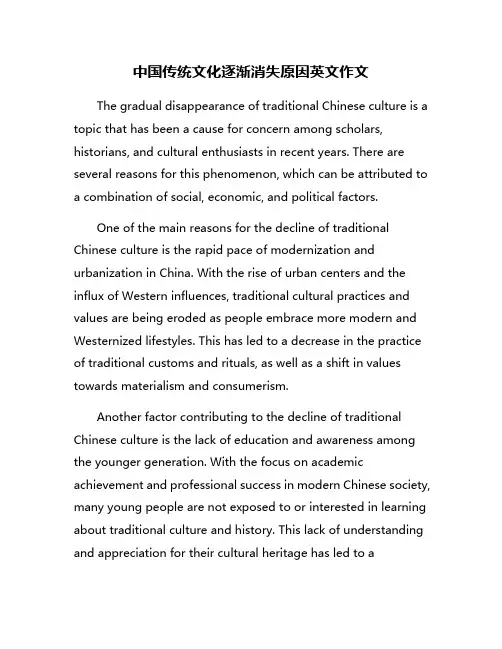
中国传统文化逐渐消失原因英文作文The gradual disappearance of traditional Chinese culture is a topic that has been a cause for concern among scholars, historians, and cultural enthusiasts in recent years. There are several reasons for this phenomenon, which can be attributed to a combination of social, economic, and political factors.One of the main reasons for the decline of traditional Chinese culture is the rapid pace of modernization and urbanization in China. With the rise of urban centers and the influx of Western influences, traditional cultural practices and values are being eroded as people embrace more modern and Westernized lifestyles. This has led to a decrease in the practice of traditional customs and rituals, as well as a shift in values towards materialism and consumerism.Another factor contributing to the decline of traditional Chinese culture is the lack of education and awareness among the younger generation. With the focus on academic achievement and professional success in modern Chinese society, many young people are not exposed to or interested in learning about traditional culture and history. This lack of understanding and appreciation for their cultural heritage has led to adisconnect between generations and a weakening of the transmission of traditional knowledge and practices.In addition, the Chinese government's policies and initiatives have also played a role in the disappearance of traditional culture. In an effort to promote economic growth and development, the government has prioritized modernization and industrialization over the preservation of cultural heritage. This has resulted in the neglect of traditional cultural sites and practices, as well as the suppression of dissenting voices that seek to promote traditional values and beliefs.Furthermore, the globalization of media and entertainment has also contributed to the decline of traditional Chinese culture. With the widespread availability of Western media and popular culture, many young people are more interested in following trends and fads from abroad rather than embracing their own cultural heritage. This has led to a homogenization of culture and a loss of diversity in traditional practices and beliefs.Despite these challenges, there are efforts being made to preserve and revitalize traditional Chinese culture. Cultural institutions and organizations are working to document and promote traditional practices and values, while educators are incorporating cultural education into school curricula.Additionally, there is a growing interest among young people in rediscovering their cultural roots and heritage, which has led to a revival of interest in traditional arts, crafts, and customs.In conclusion, the disappearance of traditional Chinese culture is a complex issue that is influenced by a variety of social, economic, and political factors. While there are challenges to overcome, there is also hope for the preservation and revitalization of traditional culture in China. By raising awareness, educating the younger generation, and supporting cultural initiatives, we can work towards ensuring that traditional Chinese culture continues to thrive and flourish in the modern world.。
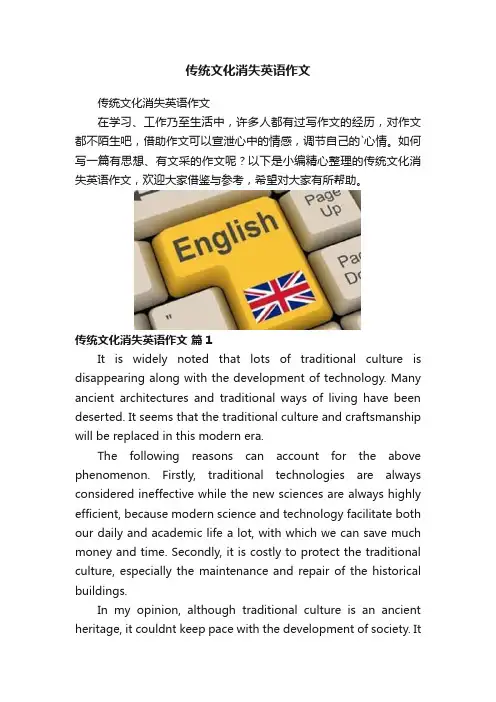
传统文化消失英语作文传统文化消失英语作文在学习、工作乃至生活中,许多人都有过写作文的经历,对作文都不陌生吧,借助作文可以宣泄心中的情感,调节自己的`心情。
如何写一篇有思想、有文采的作文呢?以下是小编精心整理的传统文化消失英语作文,欢迎大家借鉴与参考,希望对大家有所帮助。
传统文化消失英语作文篇1It is widely noted that lots of traditional culture is disappearing along with the development of technology. Many ancient architectures and traditional ways of living have been deserted. It seems that the traditional culture and craftsmanship will be replaced in this modern era.The following reasons can account for the above phenomenon. Firstly, traditional technologies are always considered ineffective while the new sciences are always highly efficient, because modern science and technology facilitate both our daily and academic life a lot, with which we can save much money and time. Secondly, it is costly to protect the traditional culture, especially the maintenance and repair of the historical buildings.In my opinion, although traditional culture is an ancient heritage, it couldnt keep pace with the development of society. Itis the tide of history that the traditional culture and technology will no doubt be eliminated in the end.传统文化消失英语作文篇2Since the big country has been found at October 1st of 1949, the People’s Republic of Chi na has gone through a history of 62 years. Looking back at the 62 years, especially in recent 30 years, we have made many great achievements in different fields. And China has been the second largest economy in the world in 2010. And as a Chinese, I am so proud of our mother country.However, on the other hand, we also have been losing many other good things such as beautiful environment and traditional culture when the GDP has increased quickly. And we also know that the traditional culture is the soul of an ancient nation. It is the most important thing. But we Chinese seem to ignore this. And that many things happened in this year like to remind us to be awake of this phenomenon. The accident of our high speed trains had taken many people’s lives away in July. And that the 2-years-old girl had been hurt to die while 18 passers should to save her.And in my opinion, the culture and civilization are so important that we can’t lose them. However the economy and technology have been developed, we will have nothing when we lost the important things. As a student, I have no idea that what should I do. And I just want to say, we must develop our traditional culture but not to abandon them.传统文化消失英语作文篇3Hello, everyone, my topic today is “we are losing our traditi onal culture”.After seeing the movie Kung Fu Panda, I was impressed deeply by its advanced cartoon technology and its abundantcharacters, but what impressed me most was the series of Chinese elements in the film, such as buildings of Chinese style, calligraphy, Tang suits and so on. I had to admit that the film makers, those Americans, seemed to know our Chinese traditional culture even more than most of us Chinese, which should made us ashamed. T o be honest, the movie Kung Fu Panda made many contributions to spreading our traditional culture, but we should not be pleased at all, we Chinese should play the most important role in spreading our own traditional culture. Kung Fu is ours, panda is ours, but Kung Fu Panda is not ours, how terrible it is!That all, thank you for your listening and it’s time for your questions now.。
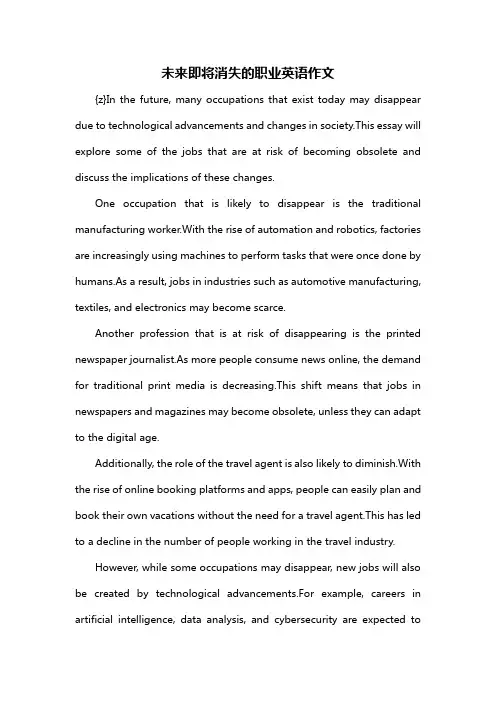
未来即将消失的职业英语作文{z}In the future, many occupations that exist today may disappear due to technological advancements and changes in society.This essay will explore some of the jobs that are at risk of becoming obsolete and discuss the implications of these changes.One occupation that is likely to disappear is the traditional manufacturing worker.With the rise of automation and robotics, factories are increasingly using machines to perform tasks that were once done by humans.As a result, jobs in industries such as automotive manufacturing, textiles, and electronics may become scarce.Another profession that is at risk of disappearing is the printed newspaper journalist.As more people consume news online, the demand for traditional print media is decreasing.This shift means that jobs in newspapers and magazines may become obsolete, unless they can adapt to the digital age.Additionally, the role of the travel agent is also likely to diminish.With the rise of online booking platforms and apps, people can easily plan and book their own vacations without the need for a travel agent.This has led to a decline in the number of people working in the travel industry.However, while some occupations may disappear, new jobs will also be created by technological advancements.For example, careers in artificial intelligence, data analysis, and cybersecurity are expected togrow significantly in the coming years.These fields require specialized skills and knowledge, and individuals who can adapt and learn new technologies will be in high demand.In conclusion, the future is likely to see many occupations disappear due to technological advancements and changes in society.Jobs in manufacturing, journalism, and the travel industry may become obsolete, unless individuals can adapt and learn new skills.However, new opportunities will also arise, particularly in fields such as artificial intelligence and cybersecurity.It is important for people to stay informed about these changes and to continue learning and developing their skills to remain relevant in the workforce of the future.。
十大即将消失的行业英语作文100词全文共3篇示例,供读者参考篇1The rapid development of technology and changes in consumer preferences are causing many industries to face the threat of extinction. Here are ten industries that are on the brink of disappearing:1. Print media: With the rise of digital media, newspapers and magazines are struggling to stay relevant and profitable.2. Retail: Traditional brick-and-mortar stores are facing tough competition from online retailers like Amazon and Alibaba.3. Travel agencies: With the popularity of online booking platforms, the need for travel agencies is diminishing.4. Movie rental stores: The convenience of streaming services like Netflix and Hulu has led to the decline of physical movie rental stores.5. Postal services: As more people communicate through email and social media, the demand for traditional mail services is decreasing.6. Coal mining: The shift towards clean energy sources like solar and wind power is causing the coal mining industry to decline.7. Video rental stores: Just like movie rental stores, video rental stores are struggling to survive in the age of streaming services.8. Telemarketing: People are becoming less tolerant of telemarketing calls, leading to a decline in this industry.9. Typewriter manufacturing: With the obsolescence of typewriters due to computers, typewriter manufacturing is becoming a thing of the past.10. Photo processing labs: With the popularity of digital cameras and smartphones, the need for photo processing labs is diminishing.As these industries face extinction, it is important for workers in these fields to adapt to the changing times and acquire new skills to stay relevant in the job market. The evolution oftechnology and consumer behavior is inevitable, and industries must be prepared to evolve or face being left behind.篇2Ten Industries That Are DisappearingIn a rapidly changing world, certain industries are facing extinction due to various reasons such as changes in technology, consumer preferences, and economic conditions. Here are ten industries that are on the verge of disappearing:1. Print publishing: With the rise of digital publications and e-books, traditional print publishing is struggling to survive.2. Video rental stores: With the convenience of online streaming services, video rental stores have become obsolete.3. Telemarketing: Annoying cold calls are becoming less effective with the rise of digital marketing tactics.4. Travel agencies: Online booking platforms have made it easier for consumers to plan and book their own travel arrangements.5. Traditional retail: Brick-and-mortar stores are facing tough competition from online retailers, leading to many closures.6. Postal services: With the decline in physical mail due to digital communication, postal services are struggling to stay afloat.7. Film photography: The rise of digital photography has rendered film photography almost obsolete.8. Typewriter manufacturing: With the widespread use of computers, typewriters are no longer in demand.9. Coal mining: As the world shifts towards cleaner energy sources, the demand for coal is decreasing.10. Handwriting analysis: With the rise of digital signatures and electronic documents, the need for handwriting analysis is diminishing.As these industries face challenges and changes, it is important for businesses and workers to adapt and evolve in order to survive in the ever-changing market.篇3Ten industries that are about to disappearWith the rapid development of technology and changing consumer preferences, some industries are facing the risk ofdisappearing in the near future. Here are ten industries that are facing the threat of extinction:1. Print media: With the rise of online news platforms and social media, print media such as newspapers and magazines are struggling to stay relevant.2. Video rental stores: The popularity of streaming services like Netflix and Hulu has led to a decline in the demand for physical copies of movies and TV shows.3. Traditional retail: Brick-and-mortar stores are facing stiff competition from online retailers like Amazon, leading to closures of many traditional retail outlets.4. Postal services: With the decline in the use of traditional mail and the rise of electronic communication, postal services are facing decreasing demand for their services.5. Fax machines: With the prevalence of email and messaging apps, fax machines are becoming obsolete as a means of communication.6. Travel agencies: The availability of online booking platforms and the rise of budget airlines have led to a decrease in the use of travel agencies for trip planning.7. Telemarketing: With the rise of spam calls and the increasing use of robocalls, telemarketing as a marketing strategy is losing its effectiveness.8. Video game arcades: The popularity of gaming consoles and online gaming has led to a decline in the number of video game arcades.9. Typewriter repair shops: With the widespread use of computers and printers, the demand for typewriters and typewriter repair services has declined.10. Photo development labs: With the rise of digital photography and online photo-sharing platforms, the need for physical photo prints has decreased, leading to the closure of many photo development labs.In conclusion, these industries are facing challenges due to changes in technology and consumer behavior. While some may be able to adapt and survive, others may disappear entirely in the near future. It is important for businesses in these industries to innovate and evolve in order to stay relevant in a rapidly changing market.。
中国传统文化逐渐消失原因英文作文全文共6篇示例,供读者参考篇1The Disappearance of Traditional Chinese CultureHello everyone! Today, I want to talk about something that is really important - the disappearance of traditional Chinese culture. Have you ever wondered why we don't see or hear about it as much as before? Well, let me tell you some reasons why this is happening.Firstly, one reason is that as time goes by, people are becoming more interested in modern things. With technology and gadgets all around us, it's easy to forget about the beautiful traditions that our ancestors practiced. We are so busy with our smartphones, video games, and social media that we don't have much time to learn about our own culture.Secondly, education plays a big role in this. In schools, we usually focus more on subjects like math, science, and English. While these are important, we don't spend enough time learning about our own culture and history. If we don't study it orunderstand its importance, how can we appreciate and preserve it?Moreover, the influence of Western culture has also played a part in the disappearance of our traditions. Movies, music, and fashion from the West have become very popular, and sometimes we forget about our own unique heritage. We start imitating the Western lifestyle and forget about the richness of our own culture.In addition, our fast-paced modern lifestyle makes it harder for us to practice and pass down traditional customs. Many traditional activities take time and effort, such as calligraphy, martial arts, and traditional crafts. We are always in a rush, and these activities require patience and dedication. As a result, we are losing the skills and knowledge that have been passed down through generations.Lastly, the rapid urbanization and globalization of China have also contributed to the decline of traditional culture. As our cities grow bigger and more modern, we tend to prioritize economic development over cultural preservation. Ancient buildings are torn down to make way for new skyscrapers, and traditional neighborhoods are replaced by shopping malls. This rapid change leaves little room for traditional culture to thrive.But don't worry, my friends! There are things we can do to prevent the complete disappearance of our traditional Chinese culture. We can start by showing more interest and curiosity about our own heritage. Let's take the time to visit museums, read books about Chinese history, and listen to stories told by our grandparents. By doing these things, we can keep our traditions alive.Furthermore, schools should give more importance to teaching Chinese culture. We can have special classes or activities that focus on traditional arts, festivals, and customs. This way, we will learn to appreciate and understand our culture from a young age.Lastly, it's important for all of us to actively participate in preserving our traditions. Let's not forget the value of traditional Chinese culture and try to incorporate it into our daily lives. We can celebrate festivals, wear traditional costumes, and learn traditional skills. By doing so, we can ensure that our beautiful heritage continues to thrive.In conclusion, the disappearance of traditional Chinese culture is a matter of concern. However, if we take steps to learn, appreciate, and preserve our traditions, we can ensure that theycontinue to be a part of our lives. Let's cherish our heritage and pass it on to future generations!I hope you enjoyed reading my essay, and remember, each one of us can make a difference in preserving our culture. Thank you!篇2Why Chinese Traditional Culture is Going AwayMy name is Li Ming and I'm 10 years old. I live in a big city in China with my mom, dad, and little sister. I love China and learning about its long history and rich traditions. But I've noticed that many of the old customs and practices are slowly disappearing from modern life. Let me tell you about some of the reasons why I think this is happening.First, China is developing and modernizing extremely quickly. Everywhere you look there are new roads, buildings, factories, and businesses. While this progress has made many people's lives easier and more convenient, it has also pushed aside a lot of the old ways of doing things. For example, instead of going to traditional open-air markets, most families now get their food from big supermarkets. Instead of learning ancient arts likecalligraphy, young people are more interested in computers and video games.Another major reason is the influence of foreign cultures, especially from the West. American movies, TV shows, music, and fashion are hugely popular in China now. Young Chinese are fascinated by celebrities and trends from overseas. As they adopt more of these modern, globalized interests and lifestyles, it leaves less room for traditional Chinese customs. My classmates would much rather look up to NBA stars or K-pop bands than study something like Peking Opera.Speaking of school, the education system in China also plays a role. Students today have a lot of pressure to perform well on tests and get into good universities. We spend most of our time studying academic subjects like math, science, and English. There aren't many opportunities to learn about our cultural heritage in a hands-on way. I wish we could take classes on things like traditional Chinese art, music, poetry, martial arts, and philosophies like Taoism and Confucianism.Then there's the issue of migration from the countryside to the cities. Hundreds of millions of people have moved away from rural areas to find better jobs and opportunities in China's megacities. But the villages and small towns are where manytraditions have been preserved for centuries, passed down from generation to generation. As those places get emptied out, there is a real risk that those unique local customs and practices will be lost forever if they aren't actively kept alive.The Chinese government does try to promote and preserve traditional culture through policies, museums, media campaigns, and holidays. But part of the problem is that some young people see those old ways as outdated or feudalistic. We are taught to be modern, scientific, and future-oriented in our thinking. So revering the ancient past can seem contradictory to that mindset of constant change and progress.Additionally, the frenetic pace of urban life makes it hard to maintain traditions that require intense dedication over many years of study and practice. The rural farmers and craftspeople of previous eras had more time for art forms like ink painting, wood carving, or shadow puppetry. But when your parents are working 60+ hour weeks in offices and factories to make ends meet, it's simply impractical.There are also environmental factors contributing to the erosion of traditional culture. Rapid industrialization has caused terrible air and water pollution, destroying some of the picturesque natural landscapes that used to inspire poets andartists. Breakneck construction has bulldozed over historic neighborhoods and archeological sites. The traditional ways of living in harmony with the land are obviously at odds with today's relentless urban sprawl.I have to admit, even in my own family there is a generational divide when it comes to honoring customs and the old ways. My parents came from the countryside, so they still pay respect to things like carrying on our ancestors' trades, celebrating holidays with all the proper rituals, and beliefs in traditional medicines or supernatural folklore. But for me and my sister, a lot of that stuff just seems strange, outdated, or even superstitious. We'd much rather look to the future than dwell on the past.Now don't get me wrong, there are still pockets of people keeping traditions alive in China, especially among older generations. You can see it at historic temples where the locals go to worship old gods, or at festivals where folk dances and food are celebrated. The overseas Chinese communities also make an effort to preserve their cultural heritage. And of course, iconic things like Chinese martial arts, traditional medicine, cuisines, languages, and festivals still have a major presence in society.But overall, there's no denying that the gravitational pull of modernization, globalization, technology, and urban lifestyles is篇3The Disappearance of Traditional Chinese CultureHello everyone! Today, I want to talk to you about something important - the disappearance of traditional Chinese culture. It's a topic that affects all of us, and I think it's important for us to understand why this is happening.Traditional Chinese culture has a long and rich history, with thousands of years of stories, traditions, and values. It includes things like calligraphy, painting, music, martial arts, and the teachings of Confucius. However, in recent years, we have seen a decline in the practice and appreciation of these traditions. Let's explore some reasons why this is happening.Firstly, the fast-paced modern life is one reason why traditional Chinese culture is disappearing. Nowadays, people are busier than ever before. We have school, homework, extracurricular activities, and so many other things to do. With all these responsibilities, we often don't have enough time to learn about and practice traditional culture. It's like we're too busyrunning to stop and appreciate the beautiful flowers along the way.Secondly, the influence of Western culture has also played a role in the decline of traditional Chinese culture. Western movies, music, and fashion have become very popular, and many young people are more interested in these things than in their own traditions. They might think that traditional Chinese culture is old-fashioned or boring. It's like they're looking at a colorful painting, but they only see the black and white.Another reason is the lack of education and awareness about traditional Chinese culture. In some schools, there is less emphasis on teaching these traditions, and students may not even know about them. If we don't learn about our own culture, how can we appreciate and preserve it? It's like having a treasure chest, but not knowing what's inside.Furthermore, the rapid development of technology has also had an impact on traditional Chinese culture. We now have smartphones, tablets, and video games that keep us entertained for hours. While technology is great, it can distract us from our traditions. It's like a magic spell that makes us forget who we are and where we come from.So, what can we do to prevent the disappearance of traditional Chinese culture? First, we need to make time for it. We can set aside a little bit of time each day to learn about and practice our traditions. We can visit museums, read books, or even talk to our grandparents to learn more about our cultural heritage.Second, we should share our traditions with others. We can organize cultural events at school or in our communities to showcase the beauty of traditional Chinese culture. By sharing, we can help others understand and appreciate our traditions.Lastly, we need to be proud of our culture. Traditional Chinese culture is unique and beautiful, and we should be proud to be a part of it. We can wear traditional clothing, listen to traditional music, and practice our traditions with pride.In conclusion, the disappearance of traditional Chinese culture is a cause for concern. However, by making time for it, sharing it with others, and being proud of it, we can help preserve our cultural heritage for future generations. Let's work together to keep our traditions alive!Thank you for listening, and I hope you have a better understanding of why traditional Chinese culture is disappearing. Let's do our part to keep it alive!篇4The Disappearance of Traditional Chinese CultureHello everyone! Today, I want to talk about something that is really important - the disappearance of traditional Chinese culture. Traditional Chinese culture is something that has been passed down from generation to generation, but sadly, it is slowly fading away. In this article, I will share with you some reasons why this is happening.Firstly, one of the reasons why traditional Chinese culture is disappearing is because of modernization. With the advancement of technology and the fast-paced lifestyle, many people are focused on the new and exciting things that are happening in the world. People are becoming more interested in Western culture and forgetting about their own traditions. For example, instead of practicing calligraphy or playing traditional Chinese musical instruments, children are spending more time on their smartphones and video games.Secondly, the education system also plays a role in the disappearance of traditional Chinese culture. Many schools are focusing more on academic subjects like math and science, and there is less emphasis on subjects like history and culture.Students are not learning about their own traditions and customs, and as a result, they are not able to appreciate the beauty of traditional Chinese culture. It is important for schools to include more cultural activities and lessons in their curriculum to help preserve our heritage.Moreover, the influence of Western culture has had a significant impact on the younger generation. Western movies, music, and fashion have become very popular among young people. They admire Western celebrities and try to imitate their lifestyles. This has led to a decline in interest in traditional Chinese culture. It is important for us to remember that our own culture is unique and valuable, and we should be proud of it.Lastly, the rapid urbanization and globalization have also contributed to the disappearance of traditional Chinese culture. Many rural areas are being transformed into modern cities, and with this transition, many traditional practices and customs are being lost. People are moving away from their hometowns and are losing touch with their cultural roots. It is crucial for us to find a balance between modernization and preserving our traditions.In conclusion, the disappearance of traditional Chinese culture is a sad reality. Factors such as modernization, the education system, the influence of Western culture, and rapidurbanization have all played a role in this process. It is important for us, as young students, to value and appreciate our own culture. Let's take pride in our traditions and work together to preserve and promote traditional Chinese culture.篇5Here's an essay of around 2000 words on the reasons behind the gradual disappearance of traditional Chinese culture, written in the voice of an elementary school student:Why Is Traditional Chinese Culture Slowly Going Away?Hi! My name is Lily, and I'm 10 years old. Today, I want to talk to you about something that has been bothering me for a while – the fact that traditional Chinese culture seems to be disappearing little by little. It makes me really sad to think that all the amazing things my ancestors created and valued might one day be forgotten.Let me start by telling you what I mean by "traditional Chinese culture." I'm talking about things like ancient philosophies like Confucianism and Taoism, arts and crafts like calligraphy and embroidery, festivals and celebrations like the Chinese New Year and the Mid-Autumn Festival, traditional architecture like pagodas and gardens, and even things liketraditional Chinese medicine and martial arts. These are practices, beliefs, and traditions that have been passed down in China for thousands of years!But nowadays, it seems like fewer and fewer people, especially young people like me, are interested in learning about or participating in these traditional things. And that makes me really sad, because I think they are such an important part of Chinese culture and history.So why is this happening? Well, from what I can tell, there are a few main reasons:Modern Life is Really Fast and BusyOne of the biggest reasons why traditional culture is disappearing is because modern life is just so fast-paced and busy these days. My parents both have really demanding jobs, and I'm always rushed from school to tutoring to extracurricular activities. We hardly have any free time!Learning things like calligraphy, embroidery, or traditional music and dance takes a lot of time and patience, which most people just don't have anymore. Celebrating traditional festivals also requires a lot of preparation and rituals, which can be hard to fit into our busy schedules.Western Influence is IncreasingAnother reason is that Western culture and ideas are becoming more and more popular and influential in China, especially among young people. We are exposed to so much Western music, movies, fashion, and lifestyles through the internet and social media. A lot of my friends think that Western things are "cooler" or more "modern" than traditional Chinese stuff.I've noticed that many of my classmates don't really understand or appreciate the meanings and histories behind traditional Chinese culture and practices. They just see them as old-fashioned or boring. It makes me sad because there is so much rich meaning and wisdom in our traditions if we take the time to understand them!Economic Development and UrbanizationMy grandparents have also told me that one of the reasons traditional culture is declining is because of how quickly China has developed economically and become more urban and modern. In the past, when most people lived in rural villages and small towns, it was much easier to maintain traditions and pass them down.But now, huge numbers of people are moving to big cities for work and education opportunities. In these cities, people are exposed to modern lifestyles and don't really have places to practice traditional culture. Construction has also destroyed a lot of historic neighborhoods, temples, and cultural sites in cities.Lack of Cultural EducationFinally, I think another big problem is that there just isn't enough education about traditional Chinese culture these days, especially in schools. We learn a little bit about major philosophies, festivals, and histories, but not in a lot of depth. And we hardly ever learn hands-on skills like calligraphy, painting, music, martial arts, or crafts.If kids aren't learning about their cultural heritage and traditions from a young age, how can we be expected to appreciate and continue them as we grow older? Cultural education is so important for keeping traditions alive, in my opinion.So those are some of the major reasons I think traditional Chinese culture and practices are slowly disappearing. It makes me really sad to think about all the amazing knowledge, arts, and wisdom that could be lost forever if we don't do something to preserve them.I really hope that my generation can find ways to balance modern life with keeping our cultural roots alive and vibrant. Maybe we can use technology in creative ways to teach traditions, or find more time by being more efficient with our schedules. We could start community groups or clubs to bond over cultural activities. Or the government could invest more in cultural education programs.Whatever the solutions are, I really believe it's so important for Chinese people to make an effort to keep our rich heritage and traditions alive and relevant. They are the things that make our culture so unique and special in this world. And I would hate to see them slowly disappear and be forgotten forever.Those are just my thoughts as a 10-year-old kid who really cares about preserving the amazing cultural legacy of China. Let me know what you think! Do you agree or disagree with my perspective? I'm really interested to hear other people's viewpoints on this important issue.篇6Title: The Disappearance of Traditional Chinese CultureIntroduction:Hi everyone! Today, I want to talk about something very important - the disappearance of traditional Chinese culture. Traditional Chinese culture is really cool, but it's slowly fading away. Let's find out why!Paragraph 1: Lack of Awareness and AppreciationOne of the main reasons why traditional Chinese culture is disappearing is because many people are not aware of its importance. It's like a treasure that is hidden and forgotten. In today's fast-paced world, people are more interested in modern things like technology and pop culture. They don't realize that traditional Chinese culture has so much wisdom and beauty. We need to learn more about it and appreciate its value.Paragraph 2: Changing LifestylesAnother reason for the decline of traditional Chinese culture is the change in our lifestyles. In the past, people used to practice traditional customs and rituals regularly. They would celebrate festivals, wear traditional clothes, and perform traditional arts. However, with the influence of Western culture and modernization, our lifestyles have changed. We now have different priorities and ways of living, which have led to a decline in practicing and passing on traditional culture.Paragraph 3: Lack of Education and Preservation EffortsEducation plays a crucial role in preserving traditional culture. Unfortunately, many schools do not focus enough on teaching traditional Chinese culture. Students are not given the opportunity to learn about it in depth. Without proper education, young people may not even know about the rich heritage of their own country. It's important for schools and families to work together to ensure that traditional culture is included in the curriculum and passed on to the next generation.Paragraph 4: Impact of GlobalizationGlobalization has brought many benefits, but it has also posed challenges to traditional Chinese culture. With the rise of the internet and social media, Western influences are spreading rapidly. Young people are more exposed to foreign cultures, which can sometimes overshadow their own cultural heritage.It's important to strike a balance between embracing globalization and preserving our traditional roots.Conclusion:In conclusion, the disappearance of traditional Chinese culture is a real concern. Lack of awareness and appreciation, changing lifestyles, the absence of education and preservationefforts, and the impact of globalization are all contributing factors. As young students, we have a responsibility to learn about and protect our cultural heritage. Let's make an effort to explore and celebrate our traditional Chinese culture, so that it can continue to thrive and inspire future generations!I hope you find this essay helpful! If you have any more questions or need further assistance, feel free to ask.。
过去十年消失的职业英语作文In the fast-paced world of today, technological advancements and shifting economic landscapes have led to the disappearance of numerous occupations that were once commonplace. As we look back at the past decade, it's remarkable to observe the significant changes that have occurred, especially in the realm of professions.One occupation that has become increasingly rare is the typesetter. Before the advent of digital publishing, typesetters were responsible for the meticulous task of arranging text and images on physical printing plates. Their skills were crucial in ensuring the accuracy and aesthetic appeal of printed materials. However, with the advent of desktop publishing and digital design tools, the need for typesetters has diminished significantly.Another profession that has disappeared in recent years is the switchboard operator. In the pre-digital era, switchboard operators were responsible for routing telephone calls to the correct destination within a company or organization. They maintained a complex system of cables and connections, ensuring that calls were connectedefficiently. However, with the widespread adoption of digital phones and automated call routing systems, the role of the switchboard operator has become obsolete.The rise of automation and robotics has also led to the disappearance of many manufacturing jobs. Factory workers, once the backbone of the manufacturing industry, are now being replaced by machines that can perform tasks more efficiently and with less error. While this technological shift has led to increased productivity, it has also resulted in significant job losses in the manufacturing sector.The film processor is another profession that has vanished in recent years. Before the advent of digital photography, film processors were essential in the photography industry. They developed and printed the physical photographs taken by photographers. However, with the widespread adoption of digital cameras and online photo printing services, the need for film processors has dwindled.The music store clerk is another occupation that has been impacted by technological advancements. In the past,music store clerks were responsible for helping customers select and purchase music, whether it was physical albums or sheet music. However, with the rise of online streaming services and digital downloads, the need for physical music stores and their clerks has decreased significantly.The travel agent, once a fixture in the tourism industry, has also become less common. Travel agents were responsible for booking travel arrangements, such as flights, hotels, and tours, for their clients. However, with the advent of online travel booking platforms and mobile apps, customers can now make their own travel arrangements with ease, eliminating the need for travel agents in many cases.These are just a few examples of the many professions that have disappeared in the past decade. The changing economic landscape, technological advancements, andshifting consumer preferences have all contributed to the decline of these occupations. While these changes have brought about new opportunities and efficiencies, they have also left many individuals searching for new career paths.As we look ahead, it's important to recognize that the future of work is constantly evolving. New technologies and economic trends will continue to reshape the job market, leading to the emergence of new professions and the disappearance of others. It's crucial that we adapt tothese changes and prepare ourselves for the opportunities and challenges that lie ahead.**过去十年消失的职业**在当下快节奏的社会中,科技进步和不断变化的经济格局导致了许多曾经常见的职业逐渐消失。
一篇关于传统文化消失的英语六级作文English: With the rapid development of globalization and modernization, traditional culture is facing the risk of disappearing. Many young people are more interested in Western culture, technology, and trends, which are easily accessible through social media and the internet. As a result, traditional customs, rituals, values, and languages are gradually fading away. The lack of interest and understanding among the younger generation is contributing to this decline, as they are more focused on following the latest fashion and technology trends. Furthermore, the influence of Western culture and lifestyle is also playing a significant role in the diminishing presence of traditional culture. It is essential to take proactive measures to preserve and promote traditional culture through various means such as education, cultural events, and community initiatives to ensure that future generations do not lose touch with their heritage and roots.中文翻译: 随着全球化和现代化的快速发展,传统文化正面临消失的危险。
Chinese Disappearing Traditional Job
——Itinerant Peddler
The economy of china developed rapidly during last 30 years
and with the development of the society, many traditional jobs are
disappearing in china.
Among these disappearing jobs, itinerant peddler disappeared
seriously. Many people are not familiar with itinerant peddler
among our teenagers. But our fathers are known this job very well.
In the past, in china’s vast rural areas, people saw itinerant
peddlers frequently. These people brought two big boxes with
themselves and they sold sewing boxes, rubber-bands, fasteners
and little toys that people need. They did not sell in one place. Of
course, they walked everywhere if they want to. They are always on
the way, when they got to a village, they always knocked little drum
and sang some folk songs which could attract people’s attention. if
someone wanted fastener, he did not pay it for money. He should
use rice or corn in exchange.
Why this job is becoming disappearing? There are many
reasons caused this phenomenon. First, they do not have market.
Chinese economy is developing frequently. And rural areas are
changed into cities. Many shops and shopping malls are set up
everywhere in modern cities. People can get whatever they want in
shopping centers. Second, no young man is willing to work on this
job. Because they can get little money from this job. So, young men
do not want to become an itinerant peddler. Now, several old men
still take part in this activity. The last reason is that
However, from my point of view, itinerant peddler is not just a
job. It is a cultural heritage. It stands for a period of the Chinese
history. Nowadays, many young people do not know about our
country’s traditional culture. I think it is very pity. As a Chinese, we
should know the development of our country. However, if we just
depend on the historical book, I think it’s far from our demand.
Itinerant peddler is a symbol of our fathers’ childhood. Though
this traditional job is disappearing in most modern cities, some of
people are still make money from this disappearing job in some
remote rural areas. And also, in some of western provinces, the
economy is not very developed, especially in remote rural areas of
western provinces. Buying goods is not convenient. They still
need itinerant peddlers. So, it shouldn’t disappear. And we need to
take action to save this traditional job.
What we need to do to save this job? I think everybody should
take the responsibility to save it. Government can protect itinerant
peddlers as a part of traditional culture and museum can display
some relevant things about itinerant peddlers. And also, we can
show how itinerant peddlers sold goods in the past in the museum.
Media can make a program to interview these itinerant peddlers.
Because media can attract more attentions on this disappearing job
and let more people know their living conditions.
Some jobs have been disappeared. It means our culture is
disappearing. When we save traditional culture, it is necessary w to
save our traditional jobs at the same time.